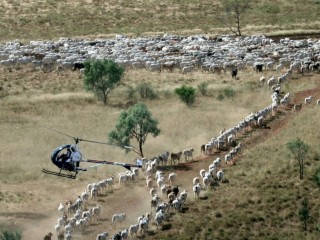 Pressure on cattle prices and increased aerial mustering and steel costs are among the likely short term impacts facing cattle producers following the Australia-wide introduction of the $23/t tonne carbon tax yesterday.
Pressure on cattle prices and increased aerial mustering and steel costs are among the likely short term impacts facing cattle producers following the Australia-wide introduction of the $23/t tonne carbon tax yesterday.
Many will be watching cattle markets around the country this week to see if the reported $6-8 per head costs of the tax on large-scale processors translates into downwards pressure on prices.
Direct on-costs for producers will include a widely anticipated 9-10c/litre increase in the cost of aviation fuel, which affects the many larger-scale operations that reply upon helicopter and fixed wing-aircraft for mustering and property management.
Steel costs are also set to rise, which in turn will affect fencing, yard building and general maintenance costs, but there are few indications at this point as to how much.
Australia’s largest steel manufacturers BlueScope and OneSteel have secured substantial assistance packages to soften the early impact on steel prices, with 94.5 per cent of their total carbon bills to be waived in the first year, declining by 1.3pc per year thereafter.
The two big steel-makers will also share a $300 million ''steel transformation plan'' which is included in the carbon legislation.
Despite those measures, suppliers close to the market say price rises are inevitable, and are likely to increase dramatically over time.
Steel merchant Cec Fox, Rural Steel Supplies, Brisbane, has been supplying steel to primary producers for more than 40 years, and believes the tax is the "greatest mistake" ever to have happened in Australia.
He said steel prices for producers will be forced up as a direct result of the carbon tax and higher gas and electricity costs on steel manufacturing, and cost rises will become more significant as initial exemptions on fuel for heavy transport use are lifted.
The tax will ultimately spell the end of manufacturing in Australia, he believes.
“The price of Australian steel is going to go up because of the carbon tax, there is no doubt about that,” Mr Fox said.
“Because steel is so heavy, every time someone touches it, moves it, transports it, the cost is going to go up.
“What then happens is that people will say Australian steel is getting too expensive, so we’re going to have to get cheaper steel from places that don’t have a carbon tax like China or Taiwan or Korea or Indonesia or India.
“It will be the final nail in the coffin for manufacturing in Australia – what we’re effectively doing is exporting our manufacturing industry.”
He said the true impact of the carbon tax was unlikely to become apparent until around late August or early September as steel manufactured post-July 1 begins to filter into the supply chain.
One company was already flagging price rises from August 1, but was attributing that to normal price rises.
“I have a letter from a company that says prices are going to rise by 4-5pc on the 1st of August.
“They haven’t specifically said carbon tax is responsible.
“Steel normally runs at about 1200/t, so 4pc is $48/t, and maybe a quarter to half that rise is carbon tax, with the rest CPI.”
AgForce policy director Drew Wagner said farmers as price takers will bear greater costs as a result of the scheme, while their ability to offset those impacts through income generation activities based around carbon reduction and storage under the Carbon Farming Initiative remained shrouded in uncertainty and a long way from being proven.
Farm groups had repeatedly expressed concerns to the Government about the ability of the rural sector to absorb greater costs for a tax that would achieve little environmentally, but those concerns continued to fall on deaf ears, he said.
The National Farmers Federation said three separate studies by the Australian Farm Institute, the Australian Bureau of Agricultural and Resources Economics and Sciences and IBIS World had all reached the same conclusion that the net result for farmers will be increased costs and reduced prices.
“Those who say that farmers will not be impacted by the carbon tax need only look at these three pieces of research, all of which show very clearly that agricultural costs are going up. The bottom line is this: Australian farmers simply cannot afford to absorb these costs into their farm businesses,” NFF president Jock Laurie said.
“Just last week the Prime Minister noted that Australia is a very efficient agricultural producer. We are because we have to be in order to compete in the global marketplace. But the additional costs that farmers will wear from the carbon tax will make us less efficient and, and a result, less competitive."
